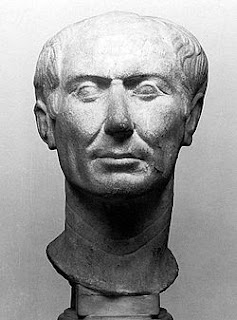
Caesar:
Who is it in the press that calls on me?
I hear a tongue shriller than all the music
Cry "Caesar!" Speak, Caesar is turn'd to hear.
Soothsayer:
Beware the ides of March.
Caesar:
What man is that?
Brutus:
A soothsayer bids you beware the ides of March.
"Julius Caesar" Act 1, scene 2, 15–19, by William Shakespeare
It is Lupercalia, an ancient Roman religious holiday. Julius Caesar, the Roman leader, and would-be dictator, appears before the "press" (crowd) in the streets. From out of the crowd, a soothsayer proclaims an infamous warning. Caesar, who was like most Romans, a very superstitious man, isn't one to take a soothsayer lightly. Nevertheless, he fails to take this warning seriously enough. And as a result, he was murdered on this date in the year 44 BC, by a group of Roman Senators, in the Roman Senate chambers themselves. Shakespeare got this scene, along with others depicting Caesar's downfall, from Plutarch's Life of Julius Caesar. English translations were easily obtained in Shakespeare's London, but the exact phrasing which Plutarch used was likely not dramatic enough for the bard's purposes. This was not terribly unusual. Shakespeare has altered the exact phrasing elsewhere in his plays for dramatic reasons, in Henry V for example. In this instance he has the soothsayer saying, "Beware the Ides of March!" Whereas the original merely has the soothsayer warning Caesar "to take heed of the day of the Ides of March."
The Rise of Julius Caesar
Whatever it was that Shakespeare and/or Plutarch had in mind, there can be no mistaking what Caesar's fellow Senators had in mind for him.... they certainly did make it plain enough. Their difficulties with Caesar were long-standing. As a politician, Caesar had outmaneuvered his rivals completely. His rise had been in association with that of Marcus Lucinius Crassus during the revolt of Spartacus, and his slave armies. During the late 60s, he had made political alliances with Crassus and Gnaeus Pompeius Magnus ("Pompey the Great"), which came to be known as the "First Triumvirate", wherein the three men would jointly run the Roman world. But this was of course an extra-legal arrangement, and it was bound to fall apart. Caesar led an invasion of Gaul (mostly modern day France) which resulted in the extension of Rome's dominion to the North Sea. Further, he conducted Rome's first invasion of Britain. These great conquests put Caesar in a position of considerable popularity and military strength. With the death of Crassus, the political tensions increased with Pompey's supporters believing that he represented the tradition of Senatorial rule of the burgeoning Roman Empire. Eventually their quarrel erupted into a Civil War in 49 BC from which the forces of Caesar emerged triumphant.
The Conspiracy Against Caesar
Having come out of the Civil War against the forces of Pompey as the undisputed leader of the Roman government, Caesar began a set of far reaching and extensive reforms of Roman society and governance. He centralized Roman government and bureaucracy in a way that left many of his one time supporters, among them Marcus Junius Brutus, and Gaius Cassius Longinus convinced that Caesar (pictured above in the "Tusculum portrait", possibly the only surviving bust of Caesar made during his lifetime) would never give up power, that he intended the Senate to be nothing more than a rubber-stamp to his will. This was too much even for these one time supporters of the man, and they conspired to assassinate him. They accosted him on that fateful day in mid-March. Historian Nicolaus of Damascus tells what happened next:
"The Senate rose in respect for his position when they saw him entering. Under the pretext of a humble request on behalf of (his) brother, Tillius Cimber approached and grasped the mantle of his toga seeming to want to make a more positive move with his hands upon Caesar. Caesar wanted to get up and use his hands, but was prevented by Cimber and became exceedingly annoyed. That was the moment for the men to set to work. All quickly unsheathed their daggers and rushed at him. First Sevilius Casca struck him the point of the blade a little above the collar-bone. Caesar rose to defend himself, and in the uproar Casca shouted out in Greek to his brother. The latter heard him and drove his sword into the ribs. After a moment, Cassius made a slash at his face, and Brutus pierced him in the side.... Under the mass of wounds, he fell at the foot of Pompey's statue. Everyone wanted to seem to have had some part in the murder, and there was not one of them who failed to strike his body as it lay there, until, wounded thirty-five times, he breathed his last."
READERS!! If you would like to comment on this, or any "Today in History" posting, I would love to hear from you!! You can either sign up to be a member of this blog and post a comment in the space provided below, or you can simply e-mail me directly at: krustybassist@gmail.com I seem to be getting hits on this site all over the world, so please do write and let me know how you like what I'm writing (or not!)!!
Sources:
"The Mammoth Book of Eyewitness History" Edited by Jon E. Lewis, Carroll and Graf Publishers, New York, 1998.
http://en.wikipedia.org/wiki/Ides_of_March
http://en.wikipedia.org/wiki/Julius_Caesar
+ 90.
+ 38.

No comments:
Post a Comment